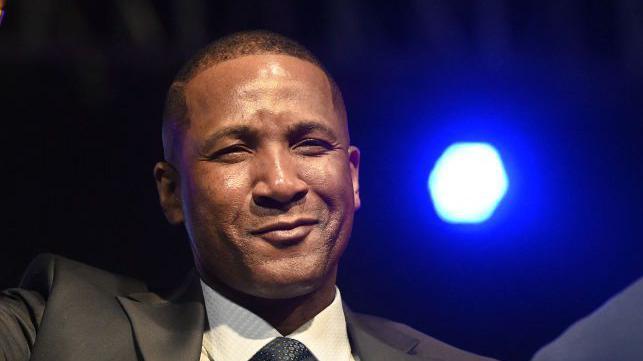Duma Boko, Botswana’s newly elected president, emerges as a figure of confidence and sophistication, reflecting his extensive background in law and human rights. At 54 years old, Boko’s articulate demeanor and well-formed thoughts evidence his legal education in both Botswana and Harvard Law School. His political journey, characterized by resilience and determination, culminated in a striking electoral victory that has been realized only after two previous attempts. For over half a century, opposition figures have aspired to dethrone the long-dominant Botswana Democratic Party (BDP), yet it was Boko’s Umbrella for Democratic Change (UDC) that succeeded in achieving this milestone, a development that caught even him by surprise. Upon his inauguration, he expressed humility rather than celebration, promising the electorate earnest dedication and seeking their guidance in times of difficulty.
Boko’s message resonated strongly with the people of Botswana, especially during a period of economic hardship. His campaign focused on themes of transformation, job creation, and financial assistance from the government, which captured the interest and support of the electorate, particularly the youth. As journalist Innocent Selatlhwa noted on the BBC’s Focus on Africa podcast, Boko’s ability to connect with supporters—actively inviting them to share their concerns—solidified his appeal as a leader who not only listens but also strives to engage with the populace. This personable approach, combined with his serious demeanor, helped forge a strong connection with citizens yearning for change in their current circumstances.
Boko’s roots trace back to Mahalapye, a small town in Botswana’s Central District, where he nurtured a sense of justice that characterized both his personal and professional life. His early display of leadership was notable even in school, where he served as president of the student council. Professionally, he became a prominent lawyer, a testament to his commitment to the legal field and the principle of justice. His ascent to leadership of the Botswana National Front (BNF) in 2010 marked a turning point; while the party had previously espoused more leftist ideologies, Boko has since moved it toward the political center, demonstrating strategic adaptability in a changing political landscape.
Boko’s innovative thinking led to the establishment of a coalition of opposition parties, resulting in the birth of the UDC, a decision born out of frustration after years of electoral defeats. This coalition strategy has been pivotal in mobilizing diverse political factions against the ruling party, significantly contributing to his eventual success. However, his candidness has not come without criticism; over a decade ago, he controversially labeled the academic staff at the University of Botswana as “useless,” a remark that attracted backlash and highlighted perceived deficiencies within the country’s education system. Boko’s straightforwardness brought attention to the struggles within various sectors, revealing a leader unafraid to confront uncomfortable truths.
Boko’s intrinsic principled nature is perhaps best illustrated in the words of his wife, Kaone Boko, who described him as someone stubbornly principled and unyielding in the pursuit of justice. This characteristic has undoubtedly been influential in his ability to navigate the complexities of a political landscape dominated by entrenched power structures. His enduring commitment to his beliefs and steadfastness in the face of challenges has provided insight into how he has remained vigilant against one of Africa’s most successful political establishments. Boko’s leadership has not only been about securing a political victory but also about championing the aspirations of a populace ready for renewal.
Looking ahead, the expectations surrounding Boko’s presidency are significant. UDC supporters are calling for concrete actions to address pressing issues such as unemployment and social inequality, emphasizing the urgent need for transformative governance. As Botswana grapples with economic woes, the nation anticipates that Boko’s presidency will usher in policies that improve lives and instill a sense of hope. The political landscape, once characterized by persistent defeat for opposition forces, now appears to be poised for change under Boko’s leadership. His administration will likely be judged not just on the promises made during his campaign but on the tangible outcomes delivered in addressing the aspirations of the people he now leads. As he embarks on this new chapter, Botswana watches closely, hopeful that the era of Duma Boko will bring about the changes that have long been sought after by its citizens.

